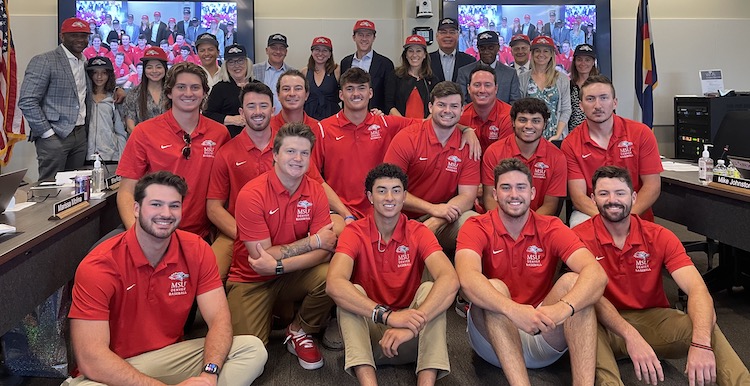

At the final board meeting of the 2021-22 academic year last week, the Metropolitan State University of Denver trustees reviewed proposed metrics that will drive the 2030 Strategic Plan and shape the future of the University.
Director of Strategy Christopher Peña outlined the metrics, framed by the intent to help University leaders make data-driven decisions to help MSU Denver reach its Strategic Plan goals.
“It’s not data for data’s sake but to help us drive action,” he said. “We need to identify operational (key performance indicators) for our partners to help them align with the strategic metrics (and) develop tools and reporting pieces that will allow them to understand how progress is going in their own areas and align that with our budget-development process.”
The proposed metrics are:
Pillar I: Student Access, Success and Achievement
- Metrics: Enrollment, bachelor’s degrees awarded, student debt at graduation, associate degree transfer graduation rate, transfer student satisfaction and student Net Promoter Score.
Pillar II: Student-Centered Academic Excellence
- Metrics: Retention rate, graduation rate, engagement, postgraduation satisfaction and social mobility.
Pillar III: Civic and Economic Catalyst
- Metrics: Economic impact, career and workforce preparation, graduates remaining in Colorado, voter-participation rate, certificate and nondegree enrollment, community-partner perceptions, community-member engagement and expert engagement.
Pillar IV: Diversity, Equity and Inclusion
- Metrics: Compositional diversity (students, faculty, staff), campus-climate inclusion, equity gaps (six-year graduation rate, share of bachelor’s degrees awarded and share of master’s degrees awarded).
Pillar V: Organizational Agility and Sustainability
- Metrics: Employee engagement, employee retention rate, fiscal-year giving, alumni giving and engagement, endowment, composite financial index, revenues and Auraria Campus development.
Peña said the Office of Strategy will develop a website to share information and provide avenues for feedback.
“Communications and education are key to this. We need to make sure everyone in our community understands what we’re doing, why we’re doing it and how they contribute to that,” he said.
Tuition-lock approved
MSU Denver will lock the cost of tuition for incoming students beginning in fall 2022, following board approval last week. The University’s tuition lock will hold tuition flat for new first-year students for four years and for first-time transfer students for two years.
The initiative aims to improve both retention and graduation rates by providing cost certainty to new students. National research has found that 18.5% of public institutions have a tuition guarantee of some sort, and that such initiatives may be associated with improved student retention.
Foregone revenue associated with future tuition increases is projected to reach $679,000 per year in four years. Success of the initiative will be measured by impact on retention and graduation rates with the financial break-even point at 102 students retained annually upon full implementation.
Eleven faculty awarded emeritus status and 18 promoted to full professorship
The trustees approved 11 retired MSU Denver faculty members for faculty-emeritus status: Rick Crosser, Ph.D., (Accounting), James Drake, Ph.D., (History), Gloria Eastman, Ph.D., (English), Jon Kent, Ph.D., (Sociology and Anthropology), Richard Krantz (Physics), Douglas Laufer (Accounting), Lindsey Packer (Mathematics and Statistics), Gerald Schultz (Computer Sciences), James Simmons (Aerospace and Engineering Sciences), Barbara Uliss, Ph.D., (Accounting) and Ann Williams (Modern Languages).
Additionally, 18 faculty members earned approval for promotion to full professor: Shelby Balik, Ph.D., (History), Nicolas Cachanosky, Ph.D., (Economics), John Carter, Ph.D., (Mathematics and Statistics), Derren Duburguet (Aviation and Aerospace Science), Jean-Francois Duclos, Ph.D., (Modern Languages), Benjamin Dyhr, Ph.D., (Mathematics and Statistics), Megan Filbin, Ph.D., (Chemistry and Biochemistry), Christina Foust, Ph.D., (Communication Studies), Margaret Frisbee, Ph.D., (History), Katherine Hill, Ph.D., (Psychological Sciences), Chalane Lechuga, Ph.D., (Chicana/Chicano Studies), Emily Matuszewicz, D.C., (Health Professions), Adriana Nieto, Ph.D., (Chicana/Chicano Studies), Jeffrey Parker (Theatre and Dance), Emily Ragan, Ph.D., (Chemistry and Biochemistry), Jessica Retrum, Ph.D., (Social Work), Mandi Schaeffer Fry, Ph.D., (Math and Statistics) and Corey Sell, Ph.D., (Elementary Education and Literacy).
Advancement’s all-time high
MSU Denver’s banner year of fundraising continues, with $9.38 million raised with weeks yet to go in the fiscal year. Advancement has surpassed its fiscal goal of $7 million already and has established an annual record for the University with more gifts expected before the end of June, according to Vice President of University Advancement Christine Márquez-Hudson.
Legislative affairs shepherds $26.5 million in strategic investments
MSU Denver secured a total of $26.6 million in additional state funds this year for the continuation of two information-technology projects ($4.2 million), construction of the Health Institute simulation labs ($10 million) and a base funding increase ($12.3 million). Director of Government Affairs Kaycee Gerhart shared that all 14 bills endorsed by MSU Denver passed, including four that create additional funding opportunities for the University and six bills that increase student access to higher ed.
Looking ahead, Gerhart said forecast state-budget constraints will pose challenges to gaining additional base and capital investments next year. In May, MSU Denver submitted two capital projects to the state for funding consideration: the Classroom to Career Hub project in the Tivoli and the full Health Institute facility proposal.
Additional updates
- The board unanimously approved MSU Denver’s Free Expression Statement Resolution, presented by General Counsel David Fine, J.D.
- Friday was the final trustees meeting for two outgoing board representatives: Faculty Trustee Bethany Fleck Dillen, Ph.D. (Psychological Sciences), and Student Trustee Savannah Martel, who graduated in May. Meredith Jeffers, Ph.D. (Modern Languages), is the new faculty trustee, while Gabe Trujillo will represent students in the upcoming year.
- Outgoing Faculty Senate President Katia Campbell, Ph.D., also gave her last report to the board. Elizabeth Goodnick, Ph.D. (Philosophy), was elected president in May.
- Martel shared that The Student Advocacy Council adopted a resolution for sustainable environmental consumption for events held by student organizations.
- The Roadrunner baseball team, pictured above, was recognized for making the NCAA Tournament for the first time in program history.
Recordings of all public board meetings are available on the trustees website. The first meetings of the 2022-23 year will be held Sept. 1-2.


